 Learning to read and write is probably the biggest schooling achievement for children and for many also the biggest challenge. We know that literacy effects all other areas of learning either for better or for worse, depending whether a child has strong literacy skills or poor ones. Research has told us lots about what makes kids good or poor readers and writers. This is a complex issue relating to things within the child, within the home and within the school. We need families, teachers and for some children therapists as well, to work together to give kids the best chance to succeed at literacy, to succeed at school and to have a bright future.
Learning to read and write is probably the biggest schooling achievement for children and for many also the biggest challenge. We know that literacy effects all other areas of learning either for better or for worse, depending whether a child has strong literacy skills or poor ones. Research has told us lots about what makes kids good or poor readers and writers. This is a complex issue relating to things within the child, within the home and within the school. We need families, teachers and for some children therapists as well, to work together to give kids the best chance to succeed at literacy, to succeed at school and to have a bright future.
Let’s look at what we know we can do that is helpful. There are some things that we can’t change about our children such as their temperament or if they have a disability, but we can see these things as a sign that we need to work hard to “shift the odds” and improve children’s chances at developing strong literacy skills. As parents we can’t change things about our past such as our own learning, literacy levels, or even things like our working hours or our income, but we can all make a commitment to make our children’s learning a priority.
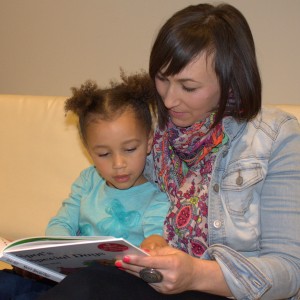 Recent surveys have shown that many parents don’t read to their children and most don’t read as often as they would like, even though most know it is a very important thing to do. Parents claim that they are too busy, too tired or too stressed. The reality for most people though is that no matter how busy you are if you can find 10 minutes, and that is all it takes, the benefits are well worth the sacrifice. Can you manage with a little less TV or Facebook to give your child a brighter future? A few minutes snuggled up with a book can be a peaceful end to a busy day for parents and kids.
Recent surveys have shown that many parents don’t read to their children and most don’t read as often as they would like, even though most know it is a very important thing to do. Parents claim that they are too busy, too tired or too stressed. The reality for most people though is that no matter how busy you are if you can find 10 minutes, and that is all it takes, the benefits are well worth the sacrifice. Can you manage with a little less TV or Facebook to give your child a brighter future? A few minutes snuggled up with a book can be a peaceful end to a busy day for parents and kids.
So what skills do preschool and junior primary children need to develop good reading skills?
The strongest predictors of good decoding (working out what the words are) skills are: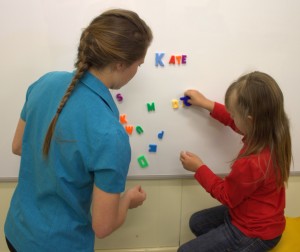
- Invented spelling (having a go at making up a way to write words)
- Alphabet knowledge (knowing what the sounds and names of letters are)
- Being able to write your own name
- Phonological awareness (hearing sounds in words and sound patterns such as rhyming)
- Oral language (being able to express yourself well)
- Print concepts (understanding about books such as how to hold them, turn the pages and how the words tell the story)
The strongest predictors of comprehension (understanding what is read) are:
- Print concepts
- Alphabet knowledge
- Phonological awareness
- Oral language
- Name writing
You might notice these are the same things in a different order. So there are five key skills kids need and we can help them learn all of these though simple activities and reading together for a few minutes each day.
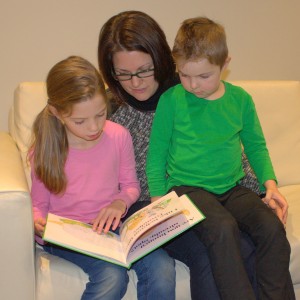 Simple things to try include:
Simple things to try include:
- Reading together as often as possible
- When reading talk about the book as well as the story. Point to the words. Talk about words, letters and sounds. Talk about rhyming words and clap out syllables in long words.
- Write your child's name often and talk about the letters, the sounds they make and let your child try to write it themselves.
- Talk to your child about daily experiences to develop their vocabulary. Ask them questions and answer theirs.
- Play with the alphabet and talk about it together. Look at alphabet books and puzzles, and play with magnetic letters on the fridge. Help your child trace, copy and write letters. Sing the alphabet song.
So how will I know when my child is developing the skills they need?
Some signs children are developing early literacy skills are: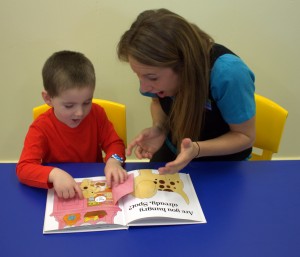
- Enjoying Listening to stories
- Making up or acting out stories
- Saying nursery rhymes
- Writing their name
- Pretending to read or write
- Identifying parts of a book (such as the name or author or the title)
- Identifying words in the environment ( such as familiar names and words on signs such as "stop" and "exit")
- Knowing the letters in their name
- Saying the alphabet
- Knowing the sounds some letters make
- Hearing rhyme and beginning sounds
What about writing? Children develop writing skills through experience and opportunity too. Children show a beginning understanding of writing by:
- Making meaningful marks on paper, initially through drawing and later through writing
- Using and understanding of different types of written texts (signs, lists, letters, invitations, etc.)
- Understanding about printed words
- Knowing about how a system of marks makes up written language
- Understanding book conventions (title, author,reading goes left to right directionality)
- Interest in print as a communicative device
- Knowledge of different print types and functions (books, magazines, letters, recipes, instructions)
- Knowledge of major print units (letters, words, sentences)
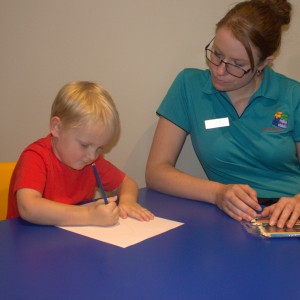 So what can we do to help kids be successful with writing?
So what can we do to help kids be successful with writing?
- Provide lots of experience with books and other written materials such as signs, recipes, letters, cards, magazines....
- Talk explicitly about what you are doing when you do reading and writing activities "look I am looking for a phone number, I am checking this bill to see what I need to pay, I am writing the address on the envelope so the postman know where to take it....
- Provide access to books, paper, pencils and other writing materials
- Visit your library and borrow books
- Make your own books with your child.
- Retell stories from familiar books by looking at the pictures, and retell things that you have done in real life too.
- Include reading and writing in play by pretending shops, schools, libraries and post offices.
Much of this work on emergent literacy comes from the work of American Speech Pathologist and researcher Laura Justice. You can read more about emergent literacy here.
Children with speech and language delays have extra challenges learning to read and write. Getting support for this as early as possible can reduce the impact of these difficulties on the development of literacy. To find out more about how Talking Matters can help with your child's speech, language and literacy follow the links. We have lots of free activities to help kids develop skills too. Check our downloads to find out more.
To keep up to date with new resources and information to develop children's language and literacy skills check our Pinterest page. Follow us on Facebook and Twitter to keep up to date with new information, tips and resources.
Related Blog Posts
If you liked this post you may also like:
Descriptive language
Speech, Language and School Success
Multi-sensory words
Reading and writing



